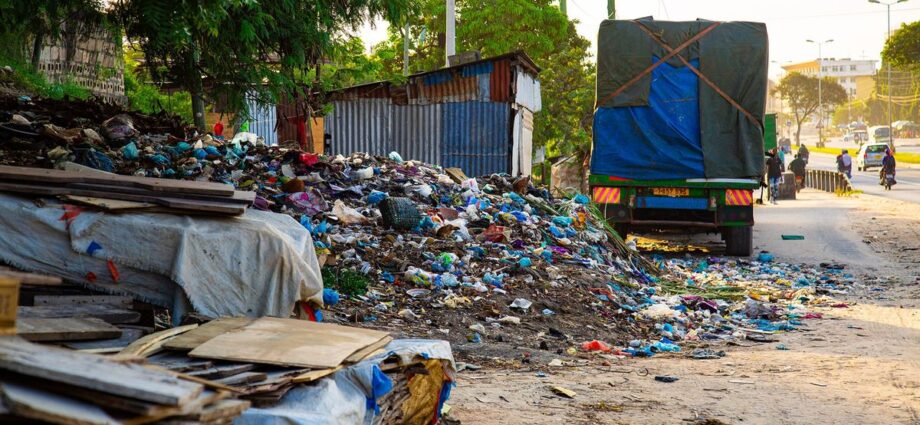
By Oscar Kimaro
Tanzania is grappling with a mounting plastic pollution problem. According to A report from the Vice President’s Office, the country generates up to 20.7 million tonnes of solid waste annually, with urban areas like Dar es Salaam contributing significantly. Alarmingly, only 5 to 10 percent of this waste is recycled, despite 70 percent being recyclable materials such as plastics, paper, metals and electronic waste.
Plastic waste alone accounts for approximately 0.84 to 1.21 million metric tonnes each year, yet less than 4 percent is recycled. In 2018, an estimated 29,000 tonnes of plastic found their way into Tanzania’s oceans, rivers and lakes, with Kinondoni, Ilala and Temeke in Dar es Salaam being major contributors.
Recent clean-up operations along the Feza River in Dar es Salaam led by the Waste Free Oceans initiative have revealed that polyethylene terephthalate (PET) bottles, which can persist in the environment for up to 450 years, are among the most prevalent plastic pollutants.
Although Tanzania enacted a ban on plastic carrier bags in 2015, with full enforcement beginning in 2019, implementation remains inconsistent. Other forms of single-use plastics continue to flood markets and ecosystems. Reports from police operations have exposed ongoing smuggling of banned plastic bags across borders, highlighting significant enforcement weaknesses, particularly at entry points.
Effectively addressing the plastic pollution crisis in Tanzania requires a coordinated, multi-stakeholder approach involving government, industry and communities. A critical starting point is the strengthening of policy and regulatory frameworks to shift from voluntary guidelines to mandatory Extended Producer Responsibility (EPR) schemes. These would require producers to take full accountability for the entire lifecycle of their plastic products, from design to post-consumer disposal.
Plastic bottles are now a ubiquitous presence in streets, drainage systems and public spaces across Tanzania. Yet, street waste collectors and aggregators report that many of these bottles are frequently rejected by recycling facilities due to issues such as material inconsistency, contamination, or incompatibility with available recycling technology. To mitigate this challenge, the government should establish standardised guidelines for plastic packaging materials, including mandatory labelling and design specifications to ensure recyclability.
Additionally, targeted support should be provided to upgrade recycling technologies to accommodate a wider range of plastics. Crucially, enforcement mechanisms must be strengthened, businesses that violate established packaging and waste management regulations should face clear, enforceable penalties such as fines, suspension of licenses, or restrictions on imports. Manufacturers and businesses umbrella institutions should impose self-accountability mechanisms requiring companies and agencies to report on their plastic usage and waste management practices and to set measurable goals for reduction and recycling. Regulatory agencies must be empowered and resourced to monitor compliance and take swift action against violators.
There is a pressing need to strategically invest in the expansion and modernisation of recycling infrastructure, particularly in urban hotspots such as Dar es Salaam, where current recycling rates remain below 10 percent. Aligning with the Prime Minister’s recent call for increased investment in recycling facilities, government agencies, especially Local Government Authorities as well as the private sector, must prioritise the establishment of accessible and well-equipped centres within proximity to communities.
Equally important is the formalisation of the informal waste sector. By providing training, tools and fair compensation, the government can empower waste collectors who play a vital role in solid waste recovery. This approach not only enhances collection efficiency but also stimulates local economies and fosters a broader appetite for recycling across various regions of the country.
As users of plastic products, it is paramount to educate citizens on the environmental and health impacts of plastic pollution and promote behavioural change towards waste reduction, measures such as incorporate topics on plastic pollution and sustainability into school curricula to instil eco-conscious values from an early age. If citizens and leaders are aware of the impacts of environmental pollution, it is evident that with time, they will commit to protecting the environment.
As a member of the Global Plastic Action Partnership (GPAP) and with the establishment of its national chapter, the National Plastic Action Partnership (NPAP), Tanzania has positioned itself as an active player in the global movement to combat plastic pollution. It is therefore imperative that the country maintains meaningful engagement in international agreements and platforms focused on plastic reduction, while also adopting best practices and technologies from countries leading in circular economy transitions.
To translate these commitments into measurable outcomes, Tanzania must establish transparent mechanisms for tracking and reporting progress against both national and international environmental targets. These mechanisms should be institutionalised within routine internal and external audit processes to enable independent, data-driven evaluations of policy implementation, enforcement and impact. Embedding plastic pollution metrics into national audit frameworks will not only enhance accountability but also help identify gaps and guide timely corrective actions.
There is a need to remind ourselves that the fight against plastic pollution in Tanzania requires immediate and concerted efforts across all sectors of society. By implementing robust policies, investing in infrastructure, promoting sustainable practices and fostering public awareness, Tanzania can pave the way towards a cleaner and more sustainable future.
Oscar Kimaro is Senior Manager, Resource Mobilisation and Partnerships, at Private Agricultural Sector Support (PASS) Trust, a development finance institution working to support climate resilient agribusiness practices in Tanzania.
X @osckim and LinkedIn @OscarKimaro














